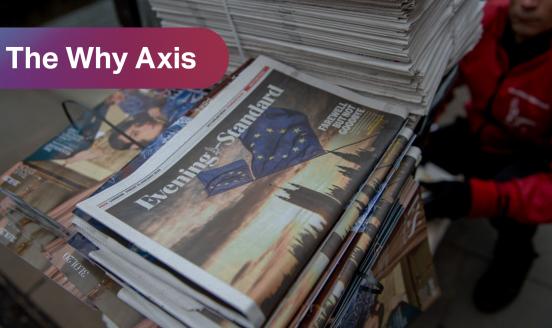The era of corporate split personalities
The saga of securities exchanges consolidation is a vivid illustration of links between companies and nations in a state of flux. The likes of the New York Stock Exchange (NYSE) are national icons of capitalism. But they are also technology-enabled networks that connect market participants and seek a global reach to maximize economies of scale, just like Facebook or eBay. The tension between symbol and business substance has permeated the battle over NYSE Euronext. New York Senator Charles Schumer said he would support Deutsche Börse’s bid only if the NYSE name came first in christening the merged entity. Nasdaq envisaged moving one of its data centers from the UK to France to signal commitment to the place de Paris, but backed off under opposition from its London-based high-frequency-trading hedge-fund clients.
Debates on corporate nationality are nothing new. In 1967, George W. Ball, an American diplomat and financier, predicted that companies would increasingly escape their original home bias and acquire a stateless identity. In the early 1990s, a memorable controversy pitted Robert Reich, who argued that the US government’s attitudes to corporations should be nationality-blind, against Laura Tyson, who replied that “American ownership still matters” – both later became senior figures in the Clinton Administration.
The great globalization from the 1990s to 2007-08 gave credence to Ball’s vision. Most large European companies now have only a minority of their operations in their country of origin. Entire sectors, such as telecoms, utilities and banking, internationalized quickly following partial deregulation and privatization. After 2000, even R&D and headquarters functions, long seen as mostly tied to the home country, were gradually distributed around the world. Symbolic milestones included Wal-Mart’s relocation of its procurement function to Shenzhen in 2002, followed by IBM in 2006, the move of Halliburton’s CEO to Dubai in 2007, and that of HSBC’s CEO to Hong Kong in 2009. National labels were still routinely attached to companies, but by the late 2000s they looked increasingly like misnomers.
The past few years, however, have made things more complicated, for two main reasons. First is the breathtaking rise of large companies from emerging economies. These now feature as prominently as European ones in global league tables, compared with a ratio of one to ten a decade ago, and their share of the global total has surged from 10 to 25 per cent in the past five years (aggregate market values based on FT Global 500 rankings). They are often subject to hands-on state oversight, if not outright control, and generally carry a stronger sense of national identity than most Western peers, partly but not only because of their focus on high domestic growth at home. As there tends to be less geopolitical alignment with and among emerging countries than among advanced ones, their increased global presence also raises unprecedented national security concerns. Some analysts like Ian Bremmer from the Eurasia Group warn that emerging countries’ “state capitalism” threatens the core of the West’s business model and heralds an “end of the free market.” Even with a less dramatic assessment, strong corporate national identities can no longer be seen as just a thing of the past.
The second factor is the recent financial crisis, and the unprecedented state intervention that resulted in the US and Europe, confirming the dictum (diversely attributed to Charles Goodhart or Mervyn King) that “cross-border banks are international in life, but national in death.” This at times extended to other industries, such as car companies in the US or France. The internationalization of corporate identities suddenly looked like a mask that could easily fall. This apparent reversal chimes with uncertainties about the future of financial globalization, most acutely felt in the euro crisis but relayed by wider concerns about “financial repression” in massively indebted countries.
These conflicting trends are likely to result in policy volatility. On paper, most public policies do not discriminate according to corporate nationality, a principle on which the EU legal framework is particularly strict. But the attempt to impose “buy American” provisions in the 2009 US stimulus, or the recent debate in Italy on how to counter foreign takeovers, show that it cannot be taken for granted. More insidiously still, companies may find it increasingly difficult to give a clear vision of their national orientation, or lack thereof, to their own staff, clients, and other stakeholders. The personality split between national and global can easily lead to irresponsible behavior, as with those banks that practiced massive regulatory and tax arbitrage, and then hijacked home-country governments when the system came under threat. It has become received wisdom among foreign policy observers that the next decade will be one of divided sovereignties, unstable politics of interdependence, and conflicts between national constituencies and globalized elites. It would be naïve for companies to think they can easily escape these tensions.



